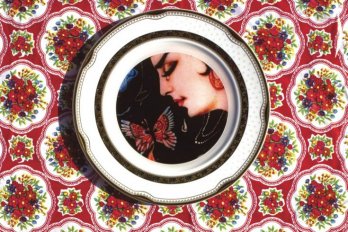The Pope. Prince Rainier. Terri Schiavo. Numerous murders in Toronto the Good. More Iraqis. Satire. Context. Vocabulary. Death, not rebirth, seemed to haunt the news this spring, and it was hard to keep up with all those who passed away. Strangely, but perhaps not so, what with the Gomery inquiry and the shock and awe of an outraged public making headlines, the death I kept considering was that of Mordecai Richler, who parted forever from the Canadian cultural and political landscape on July 3, 2001. With Paul Martin’s national television address and the shadowy Stephen Harper promising transparency, were he still with us, hale and hearty and in satiric trim, what a field day Richler would be having. What glorious ripostes, I like to imagine, he would deliver on the top story: celebrity deaths, including that of our federation. I can only guess.
Karol Wojtyla, a.k.a. Pope John Paul II, died but was much loved. Sure, there was criticism, like Hans Kung in the Toronto Star the morning after, summarizing, rather tersely, this Pope’s reign of terror on the Jesuit tradition, his recruiting failures, his meddling in the bedrooms of the world, his rigid conservatism. Had Richler been Kung, the Star item might have read: “I wrote a 1,000-page book titled Does God Exist? It is an intellectual meditation. Karol Wojtyla simply said, ‘Yes, he does,’ and turned off the switch of inquiry.”
Prince Rainier III died too, but, after a “marriage of the century,” this family man no doubt joined Wojtyla in heaven, where the Pope, stripped of his empire, might let down his guard, ponder his anti-contraceptive stance on aids in Africa, and question core beliefs. Rainier, a valiant soldier who helped free Alsace from Nazi occupation, might have a thing or two to say about the Pope’s flirtations with Opus Dei and about Joseph Ratzinger, the new Pope and Wojtyla’s cerebral collaborator.
Joining them will be the feeding-tube woman from Florida, who, despite her family’s best wishes, died many times over, and thus became a martyr for the cause. Exactly what cause—apart from the family grubbing for money—remains an open question. It could be that the best rationale for keeping Terri Schiavo alive was that she was, indeed, an endangered species—a true native of Florida, a place, one can imagine Richler thinking, that more closely resembles a banana republic (filled with home-away-from-home minorities demanding this and that) than it does an honoured state of the Union.
An increasing number of murders beset Toronto this spring, and dozens of Iraqis also died. But these deaths were lost in the industry of celebrity death—the selling of newspapers, of myriad special-edition glossy magazines, of movie rights—and in the “explosive testimony” (the phrase employed so often it ceased to have meaning) reported on daily from the Gomery commission. In this sound and fury signifying nothing much, Richler’s pen, I’m guessing, would have dropped on Bloc Québécois leader Gilles Duceppe and the notion of his post-adscam return to la belle province, maître chez nous, to lead the Parti Québécois toward full and independent statehood.
On Quebec’s political leadership and the death or impossibility of a united Canada, a Canada strung together through strong legislation like the Clarity Act, not through unseemly Ottawa-Quebec advertising contracts, Richler might have opined that René Lévesque was a tough nut, but it wasn’t bad for the white Rhodesians of Westmount to hear him spit “wasp,” and he was genuine enough to stay home. But the supposedly indépendantiste Jacques Parizeau was a graduate of the London School of Economics, and a Queen Elizabeth-loving opportunist who insisted on English-speaking governesses and whose children attended private English schools. Lucien Bouchard (coincidentally also a believer in English private education for the little ones) was little more than the Quebec kingmaker for Brian Mulroney, a prime minister at least as capable as Chrétien of buying Quebec votes. And now, watch Duceppe follow Bouchard from Ottawa’s federal theatre to a Quebec conclave, where, like the one in Rome, the sycophants insist, “It is about faith, not politics.”
In a 1991 article for the New Yorker, Richler wrote: “The truth is that we have always done things differently in Quebec, our laws seldom being quite what they appear to be. During the 1940s, for example, gambling casinos and bordellos were both illegal, but in fact Montreal was a wide-open city. Before making a raid in those days, our cops, a considerate bunch, unfailingly phoned the proprietor to settle on an appropriate number of sinners to be booked and, on leaving, solemnly padlocked a toilet rather than the front door, minimizing inconvenience to the clientele once play had resumed.”
If only Richler were with us still, for all kinds of reasons. But a big one is how good it would be to have him around for the election. He’d breathe some life into it.






